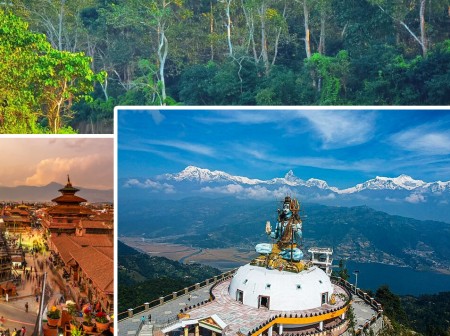.jpg)
Top 20 Things to Know Before Visiting Nepal
- soleencounters
Nepal, a mystical land nestled between India and China, continues to charm travelers with its soaring Himalayan peaks, vibrant cultural traditions, and deep spiritual heritage. Whether you’re visiting for a high-altitude trek like the Everest Base Camp Trek or to explore ancient temples in Kathmandu, being well-prepared enhances your travel experience immensely.
Table of Contents
At Sole Encounters Trekking Pvt. Ltd., we’ve compiled this authoritative list of the Top 20 Things to Know Before Visiting Nepal in 2025—a must-read for every first-time or returning traveler planning a journey to this enchanting destination.
1. Nepal is Open and Safe for Travelers in 2025
Nepal has fully reopened for international tourism with enhanced health protocols. As of 2025, there are no mandatory COVID-19 restrictions for vaccinated travelers. Entry is smooth, and the tourism sector is well-prepared to welcome global visitors with safety and warmth.
2. Visa on Arrival Is Available
Travelers can obtain a visa on arrival at Tribhuvan International Airport in Kathmandu or at several land borders. Here’s what you need:
- A valid passport (minimum 6 months validity)
- A passport-size photo
- Visa fees in USD (15 days – $30, 30 days – $50, 90 days – $125)
Online pre-arrival visa applications can be completed to save time at immigration: Nepal Immigration Website.
3. Best Time to Visit Nepal
While Nepal can be visited year-round, spring (March–May) and autumn (September–November) are the most favorable seasons for trekking, sightseeing, and cultural experiences. These months offer clear skies, moderate temperatures, and excellent mountain visibility.
Quick Climate Tip:
- Winter (Dec–Feb): Great for lower-elevation treks and fewer crowds.
- Monsoon (Jun–Aug): Lush landscapes but heavy rain affects highland trails.
4. Trekking Is Nepal’s Crown Jewel
Home to 8 of the 14 world’s highest peaks, Nepal is a trekker’s paradise. Popular trekking routes include:
- Everest Base Camp Trek
- Annapurna Base Camp Trek
- Langtang Valley Trek
- Manaslu Circuit Trek
Trekking permits (TIMS & National Park or Conservation Area permits) are mandatory, and hiring a licensed guide is now required in restricted areas and strongly recommended everywhere for safety.
5. Cultural Etiquette Matters
Respect is vital in Nepalese culture. A few local customs to keep in mind:
- Greet with “Namaste” with hands pressed together.
- Remove shoes before entering homes or temples.
- Dress modestly, especially in rural or religious areas.
- Avoid touching heads or pointing feet at people or sacred objects.
6. The Currency: Nepalese Rupee (NPR)
1 USD ≈ 130-135 NPR (as of early 2025).
You’ll find ATMs in cities and tourist towns. However, cash is king in remote trekking regions and smaller businesses, so carry local currency, especially for rural travel.
7. Nepal Is Budget-Friendly
From affordable guesthouses to luxury lodges, Nepal caters to all budgets. A basic daily budget can range from $30–$50 for backpackers, while mid-range travelers may spend around $60–$100 per day including meals, accommodation, and transportation.
8. Connectivity & SIM Cards
Nepal has good mobile coverage in cities and even in many trekking regions. Local SIM cards (like Ncell or NTC) are easily available at the airport or telecom shops. For treks, consider a data plan + offline maps for added convenience.
9. Altitude Sickness Is Real
If you’re trekking above 2,500 meters (e.g., Everest, Annapurna), understand the risks of Acute Mountain Sickness (AMS). Preventive tips include:
- Ascend gradually
- Stay hydrated
- Take rest/acclimatization days
- Consider Diamox (consult your doctor first)
10. Tipping Is Expected in Tourism
Tipping isn’t mandatory, but it's highly appreciated by guides, porters, and service staff. General guidance:
- Trekking guides: $5–$10 per day
- Porters: $3–$7 per day
- Restaurants: 5%–10% for excellent service
11. English Is Widely Spoken in Tourist Areas
While Nepali is the official language, English is commonly spoken in cities, trekking regions, and tourist-related businesses.
12. Unique UNESCO World Heritage Sites
Don’t miss:
- Kathmandu Durbar Square
- Swayambhunath (Monkey Temple)
- Boudhanath Stupa
- Patan & Bhaktapur Cities
- Lumbini (Birthplace of Buddha)
- Chitwan National Park
These sites showcase Nepal’s architectural marvels and spiritual depth.
13. Delicious Local Food
Nepali cuisine is simple, hearty, and flavorful. Try:
- Dal Bhat – lentil soup with rice and vegetables (trekkers’ staple)
- Momos – Nepali dumplings
- Thukpa – Tibetan-style noodle soup
Tip: Bring mild stomach medicine for initial days as your body adjusts.
14. Travel Insurance Is a Must
Choose travel insurance that covers high-altitude trekking, helicopter evacuation, and trip cancellations. It's a requirement for many treks and provides peace of mind.
15. Transportation in Nepal Can Be Slow but Scenic
Domestic flights, tourist buses, and jeeps are common modes of transport. While roads can be bumpy, journeys often offer stunning views and local flavor. Book flights to/from Lukla, Pokhara, and Jomsom well in advance during peak seasons.
16. Power Cuts Are Rare in Cities, Common in Remote Areas
Major cities have stable electricity, but power cuts still occur in rural areas and on treks. Bring a power bank and headlamp, especially for teahouse stays.
17. Pack Light, Smart & Seasonally
Essentials include:
- Layers for changing temperatures
- Trekking boots
- Sunscreen and sunglasses
- Reusable water bottle + purification tablets
- Down jacket (can be rented in Kathmandu)
18. Sustainable Travel Is Encouraged
Support eco-conscious lodges, minimize plastic use, and respect wildlife and nature. At Sole Encounters Trekking, we promote responsible tourism that uplifts local communities.
19. Custom Tours & Experiences Are Available
Beyond trekking, you can:
- Take a scenic mountain flight to Everest
- Go paragliding in Pokhara
- Join yoga retreats, cooking classes, or cultural tours
- Explore off-the-beaten-path treks in regions like Dolpo or Mustang
20. Book with a Local, Licensed Tour Operator
Booking your trip with a local company like Sole Encounters Trekking Pvt. Ltd. ensures:
- Authentic local insights
- Safer, hassle-free logistics
- Ethical travel practices
- Direct support to Nepali communities
Explore our curated trips like the Everest Base Camp Trek or the Annapurna Base Camp Trek for life-changing experiences.
Final Thoughts
Nepal is more than just mountains—it’s a deeply spiritual, welcoming, and diverse destination that rewards curious, respectful travelers. Whether you’re coming for adventure, culture, or soul-searching, being informed helps you travel smarter and deeper.
Let Sole Encounters Trekking Pvt. Ltd. help you craft your unforgettable Nepal journey in 2025.
Contact us today to start planning! or Talk to our expert team
Recent Posts
.jpg)
3rd Jul, 2025
.jpg)
4th Jul, 2025
.jpg)
4th Jul, 2025
.jpg)
7th Jul, 2025
.jpg)
8th Jul, 2025
.jpg)
8th Jul, 2025
.jpg)
8th Jul, 2025

10th Jul, 2025








